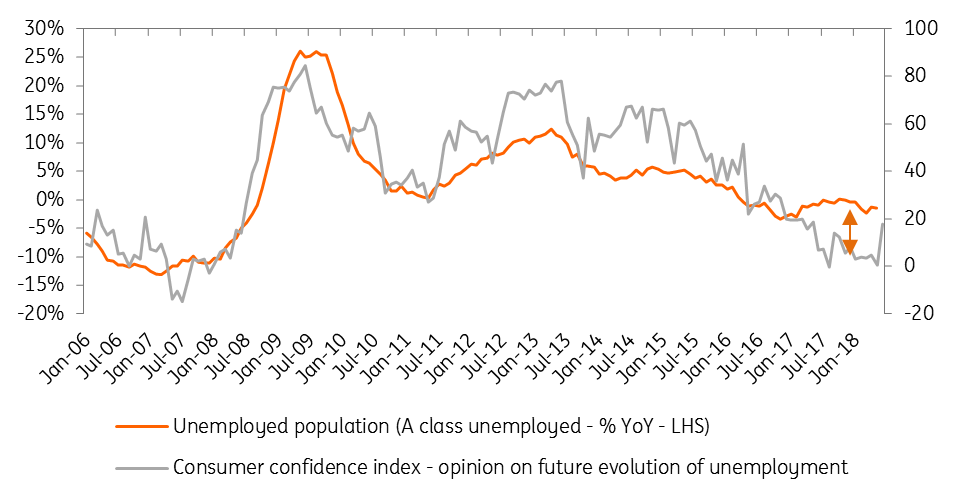France: Unemployment fears return
The unemployed population increased by another 10,000 in May, the second monthly increase in a row. This could start to have an effect on growth, as consumer confidence declined in June on the back of growing unemployment fears. This could dampen summer holiday spending
| 97 |
Consumer confidence level in June, the lowest since August 2016 |
| Lower than expected | |
Unemployment increased for a second month in a row in May
The 12,400 increase in the unemployed population registered in April was not a one-off after all: 10,300 new unemployed were registered in May, leading to the largest increase in almost a year. Since the beginning of the year, figures have been disappointing, even accounting for the strong decline registered in February. The unemployed population is declining at the rhythm of 3,800 per month in 2018. It is quicker than last year (a mere -1,000 per month), but much slower than the previous recovery (2005-2007) when the unemployed population was declining at a pace of 20,000 per month. The current rhythm is too slow to confirm the belief among consumers that this is a long-lasting trend, even if the current stage of the cycle should normally see further unemployment drops.

Low morale could dampen summer holiday spending
This has had an impact on consumer confidence which declined from 99.3 to 97 in June, its lowest level since August 2016. The fear of unemployment, which had been receding in the last 12 months, bounced back in May, leading to the drop in the overall index, together with a fresh drop in purchasing intentions. The second quarter confidence data doesn't bode well for private consumption growth during the summer. Second-quarter spending growth should show a rebound after a dismal start to the year, although it will be weakened by the effects of strikes on holiday consumption during Easter and the long weekends of May. In 2018, we therefore continue to believe that private consumption will only post a very meagre acceleration from the weak 1.1% registered in 2017.
Download
Download article"THINK Outside" is a collection of specially commissioned content from third-party sources, such as economic think-tanks and academic institutions, that ING deems reliable and from non-research departments within ING. ING Bank N.V. ("ING") uses these sources to expand the range of opinions you can find on the THINK website. Some of these sources are not the property of or managed by ING, and therefore ING cannot always guarantee the correctness, completeness, actuality and quality of such sources, nor the availability at any given time of the data and information provided, and ING cannot accept any liability in this respect, insofar as this is permissible pursuant to the applicable laws and regulations.
This publication does not necessarily reflect the ING house view. This publication has been prepared solely for information purposes without regard to any particular user's investment objectives, financial situation, or means. The information in the publication is not an investment recommendation and it is not investment, legal or tax advice or an offer or solicitation to purchase or sell any financial instrument. Reasonable care has been taken to ensure that this publication is not untrue or misleading when published, but ING does not represent that it is accurate or complete. ING does not accept any liability for any direct, indirect or consequential loss arising from any use of this publication. Unless otherwise stated, any views, forecasts, or estimates are solely those of the author(s), as of the date of the publication and are subject to change without notice.
The distribution of this publication may be restricted by law or regulation in different jurisdictions and persons into whose possession this publication comes should inform themselves about, and observe, such restrictions.
Copyright and database rights protection exists in this report and it may not be reproduced, distributed or published by any person for any purpose without the prior express consent of ING. All rights are reserved.
ING Bank N.V. is authorised by the Dutch Central Bank and supervised by the European Central Bank (ECB), the Dutch Central Bank (DNB) and the Dutch Authority for the Financial Markets (AFM). ING Bank N.V. is incorporated in the Netherlands (Trade Register no. 33031431 Amsterdam).